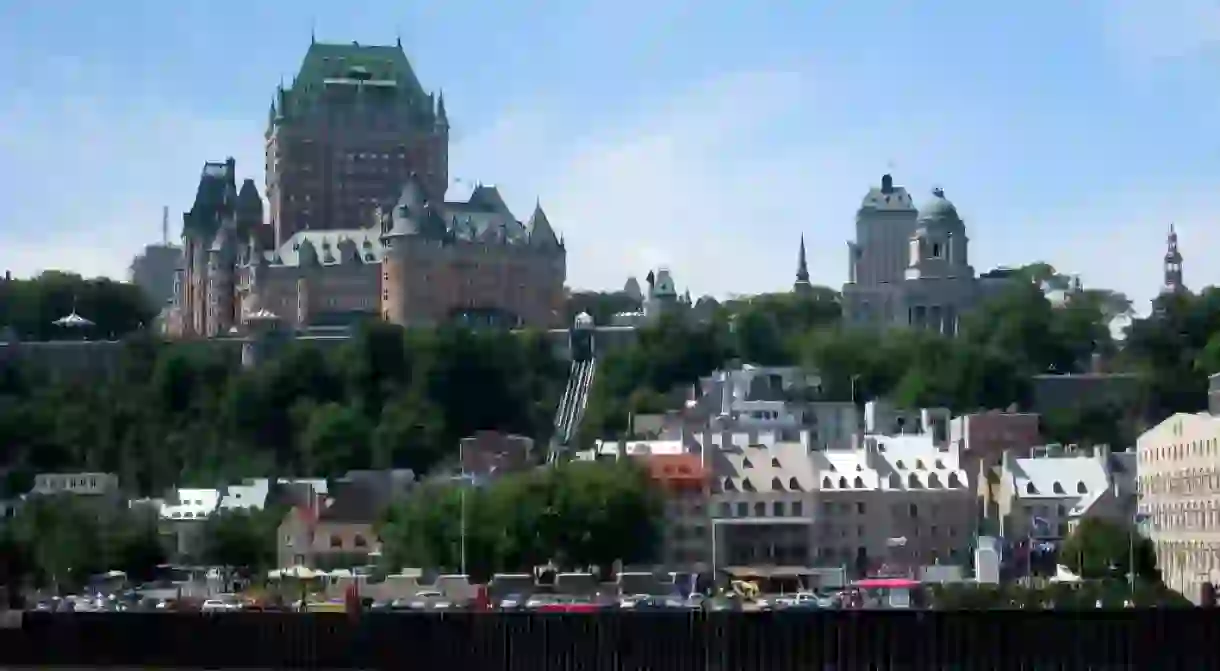A Tour of Quebec City's Historical Architectural Landmarks

The architectural cityscape of Quebec City has developed through centuries of French and British occupation, invasion, historical preservation and modern innovations. As a result, the city’s landmarks reflect a mosaic of styles that make for a distinctive architectural experience. From Ancien Regime to Neoclassical to Art Deco, here is a tour of some landmarks of Quebec City’s architecture through the ages.
Maison Jacquet
Dating from around 1675, Maison Jacquet holds the distinction of being the oldest surviving private residence in Quebec City. Located on Rue Saint Louis in the historic Upper Town, it has sturdy, plastered and whitewashed stone walls and a steep red roof with dormer windows. The residence withstood various numerous conflicts, as reflected by the cannonball still wedged in a tree opposite. The Maison is now home to a restaurant, Aux Anciens Canadiens.
Maison Jacquet/ Aux Anciens Canadiens, 34 Rue Saint Louis, Québec City, Canada, +1 (418) 692-1627
Basilica Notre Dame de Québec
Located in the Latin Quarter of the city’s Upper Town, the Basilica Notre Dame de Québec was first established in 1633, making it the oldest parish church north of Mexico. The church has been destroyed by fire twice and damaged by a military offensive. Its current form was constructed in 1925, reflecting the Neoclassical features of the original cathedral. It remains one of the city’s most popular tourist destinations, with its gilded carvings, statuettes and intricate stained glass window designs.
La Basilique-Cathédrale Notre-Dame de Québec, 16 Rue De Buade, Quebec City, Canada, +1 (418) 692-2533

L’Hôtel du Parlement
Located just beyond the walls of Old Québec’s Haute-Ville, you’ll find the province’s blue-and-white fleur-de-lis flag displayed from the top of the 52 metre clock tower of the prominent National Assembly building. Reflecting the Second Empire architectural style that was popular from 1877 to 1887, L’Hôtel du Parlement recalls significant buildings across Europe and the United States that were constructed around the late 19th century. The façade includes 24 statues of important historical figures, including Quebec’s French “discoverer” Jacques Cartier and the city’s founder Samuel de Champlain.
L’Hôtel du Parlement, 1045 Rue Des Parliamentaires, Quebec City, Canada, +1 (418) 643-7239

L’Hôtel de Ville
The City Hall building was inaugurated in 1896 as a project by architect Georges-Émile Tanguay. Like the National Assembly above, L’Hôtel de Ville was built in an ornate Second Empire style. With the elaborate Notre Dame Basilica nearby, and the well-known Château Frontenac in the background, City Hall blends into the intricate skyline of towers and turrets that make Quebec City’s architectural landscape distinctive.
Hôtel de Ville de Québec, 2 Rue des Jardins, Quebec City, Canada, +1 (418) 641-6010

Château Frontenac
No tour of Quebec City’s historical architecture is complete without mentioning the grand Château Frontenac. Towering over the city’s Upper Town on Cap Diamant, it dates back to 1893 and reflects a Neo-Chateau architectural style. It incorporates Scottish baronial elements, as evidenced by the multiple turrets and towers, while also including the steep metal rooftops of that have been identified as being a characteristically “Nouvelle France” element.
Château Frontenac, 1 Rue des Carrières, Quebec City, Canada, +1 (418) 692-3861

Price Building
The Price Building was constructed between 1930 and 1931, and at the time it was the first skyscraper in Quebec City. It consists of 18 floors of mainly commercial space, and it’s one of the best examples of the Art Deco style in Canada. Its grey limestone is carved with geometric palm-like patterns, and it has a layered “wedding cake” shaped tower that makes it distinctive, while also retaining the steepled copper roof that characterizes Quebecois architectural styles.














